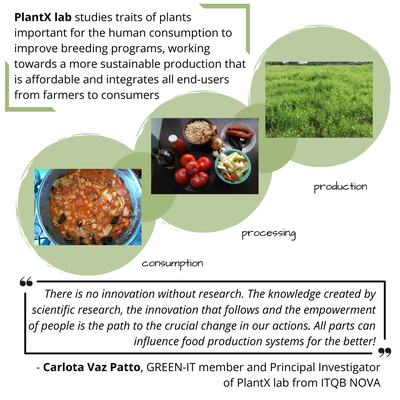World Food Day 2021
Producing, preparing, cooking and storing food. As part of the human condition, we all inevitably play a part on the agricultural-food systems and how we do it as a toll on natural resources, the environment and climate. Consequently, these systems are now center stage of various global challenges, such as climate change, resource scarcity, ecosystem degradation and biodiversity loss.
The shortcomings of the current agri-food systems are noticeable, as there are still billions of people suffering from hunger, unable to afford a healthy diet. Furthermore, with the COVID-19 pandemic, the agri-food systems’ vulnerabilities were made even more prominent, as it hindered farmers, disrupted food supply chains and pushed millions of people worldwide to require emergency food aid.
As the population grows, so does global food demand and nutritional needs, which urges an increase in production. However, due to the current global situation, it is imperative that we also decrease the negative impact of production and distribution, while still meeting quality standards and affordability. The urgency in meeting all these requirements calls upon a transition towards sustainable agri-food systems, able to provide nourishment to everyone, without compromising the economic, social and environmental bases.
 At GREEN-IT Research Unit, PlantX lab works with plants used in human consumption (beans, grass peas and others), studying the genes that control relevant characteristics, such as resistance to diseases or drought, or nutritional or organoleptic quality. This genetic knowledge allows the development of molecular tools needed to increase the efficiency of plant breeding programs, able to develop varieties that are more resilient and better acknowledge the consumer’s needs.
At GREEN-IT Research Unit, PlantX lab works with plants used in human consumption (beans, grass peas and others), studying the genes that control relevant characteristics, such as resistance to diseases or drought, or nutritional or organoleptic quality. This genetic knowledge allows the development of molecular tools needed to increase the efficiency of plant breeding programs, able to develop varieties that are more resilient and better acknowledge the consumer’s needs.
The PlantX lab works within a participatory research approach, and as they deal with a great diversity of traditional varieties of different legumes, known for their nutritional richness and agro-ecological benefits, their work promotes, in the long term, a more sustainable production of nutritious foods, at affordable prices and that integrates different end users, from farmers to consumers. “Through an integrative scientific research, that considers the several aspects of agri-food systems and does not exclude different end users, researchers will be able to co-develop and share the knowledge needed to make production systems more sustainable and resilient, leading to a faster awareness and adjustment of production and consumption patterns” explains PlantX lab Principal Investigator Carlota Vaz Patto. “There is no innovation without research. The knowledge created by scientific research, the innovation that follows it and the empowerment of people is the path to the crucial change in our actions. All parts can influence their agri-food production systems for the better!”
World Food Day is celebrated October 16th, marking the founding of the United Nations Food and Agriculture Organization. The 2021 theme is “Our actions are our future – Better production, better nutrition, a better environment and a better life”, raising awareness towards climate change, poverty and hunger.


